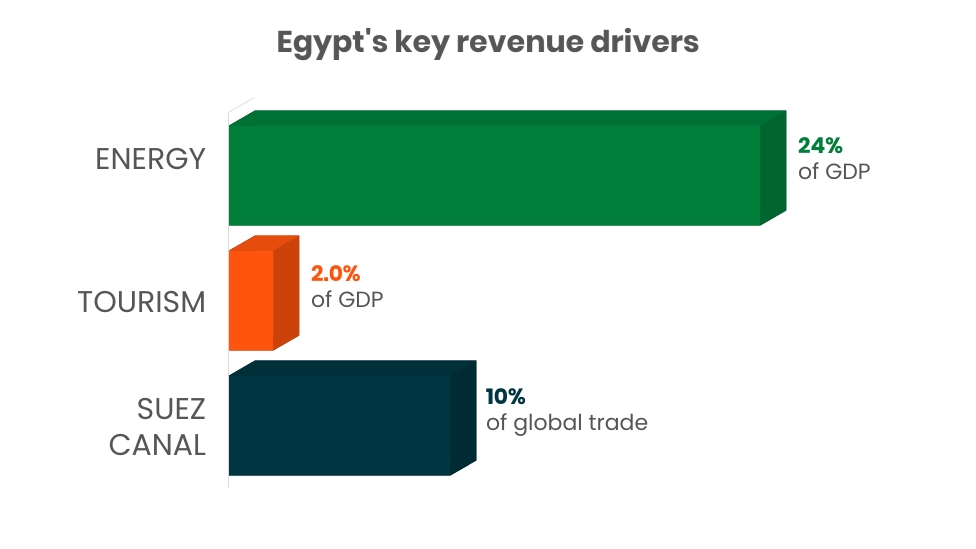The Egyptian government has embarked on a significant privatization push to revitalize its economy and attract foreign investment, selling off state assets worth a staggering 1.9 billion USD.
This ambitious move aims to boost the private sector, foster competition, and create a more investor-friendly environment, propelling Egypt toward sustainable economic growth.
So far, the government has received 1.65 billion USD out of 1.9 billion USD.
The government initially aimed to generate 2 billion USD by selling shares before the end of June. However, due to delays, a decrease in the pound’s value on the black market took place.
Compared to its value from the previous year, the official exchange rate indicates that the pound has depreciated by over 50%.
Egypt’s economic crisis has only worsened recently, prompting the government to boost private sector investment through privatization.
The deal is crucial for easing pressure on the Egyptian pound by strengthening hard currency reserves and facilitating the implementation of economic reforms under a 3 billion USD IMF loan program.
The depreciation of the Egyptian currency and the withdrawal of foreign investments have been significant challenges for the country. In addition to over 50% depreciation in its currency value vis-à-vis the US Dollar since February 2022 – the beginning of the war in Ukraine, Egypt has seen a high level of inflation lately. Until last month, inflation stood above 36%, while a third of the country’s population lives in poverty.
Key Transactions under the Deal
The deal entails selling stakes in 32 state companies, including Telecom Egypt. Telecom Egypt (WE) is a major telecommunications company in Egypt and the first integrated telecommunications operator in the country. It is also the largest provider of fixed services and the exclusive supplier of wholesale telecommunication services in the Middle East.
In addition, as part of the deal, chemical company Elab, petrochemical company Ethdyco, and oil company Egyptian Drilling Company were also sold to Abu Dhabi Development Holdings for 800 million USD.
The Egyptian government plans to sell more stakes in other companies, namely the Gabal el-Zeit wind farm, military-owned Wataniya Petroleum, and a power plant built by Siemens.
Privatization: Opening doors to different investment opportunities
By enhancing private-sector investment, privatization will create more jobs, more sources of taxable income, and improve competitiveness. The government aims to attract 10 billion USD in private investments over the next four years to meet foreign debt obligations and improve its economic situation.
Energy and Infrastructure
Egypt’s energy sector offers attractive investment opportunities, particularly in renewable energy, oil & gas, and infrastructure development.
The oil and gas industry plays a crucial role in Egypt’s economy. It contributes about 24 % to the country’s total GDP. Besides, Egypt possesses significant energy resources, including traditional fossil fuels and renewable energy.
At the end of 2020, the country had proven reserves of 3.6 billion barrels of oil and 75.5 trillion cubic feet of natural gas. The government encourages the participation of international oil companies in this sector, with over fifty of them currently operating in the country.
By allowing optimum private capital inflow in its energy assets, the country can attract domestic and international investors interested in contributing to Egypt’s energy diversification.
Manufacturing and Industrial Sectors
Egypt’s sizable consumer market, skilled workforce, and favorable business environment can be desirable to investors interested in manufacturing. Sectors such as automotive, textiles, chemicals, and food processing are well-positioned for private investments.
Despite economic challenges, Egypt’s consumer spending pattern has remained strong, reflecting the country’s economic vitality and optimism. In Q4 2022, consumer spending in Egypt rose to 2 043 billion EGP compared to 1 843 billion EGP in Q3 2022.
Tourism and Hospitality
Likewise, with its great cultural heritage and natural attractions, Egypt is well-positioned as a top tourism destination.
An optimal sale of equity in state-owned hotels, resorts, and tourist sites can be attractive to private investors interested in the tourism and hospitality sector.
In 2021, Egypt earned approximately 9.50 billion USD from the tourism sector, around 2 % of its GDP and about 57 % of international tourism income in Northern Africa. During the first quarter of fiscal year 2022/2023, tourism revenues surged by 43.5%, reaching 4.1 billion USD from 2.8 billion USD.
Fitch Solutions predicts more tourist arrivals to Egypt between 2023 and 2026, with tourism revenues expected to grow by 17.7% to reach 13.6 billion USD in 2023 and eventually reach 17.9 billion USD by the end of 2026.
Transportation and Logistics
Egypt’s strategic location and well-developed transportation networks make it a crucial regional logistics hub. Private investments in ports, airports, railways, and transportation infrastructure can enhance trade and connectivity.
Egypt’s Suez Canal is a vital energy, goods, and commodities pathway between Asia, the Middle East, and Europe. Its location is a crucial regional hub for shipping oil and other hydrocarbons.
The canal’s strategic importance lies in its role as the only route connecting European waters to the Arabian Sea. It accounts for 12% of global trade and approximately 10% of the world’s daily seaborne oil trade. With over 20,000 vessels passing through yearly, the Suez Canal connects commodity markets in Africa, Asia, and Europe.
Privatizing a part of the canal can have significant economic and geopolitical implications. However, deciding to privatize a part of the Suez Canal can be highly controversial. Hence, implementing any such initiative would require a broad consensus.
Egypt’s initiative to sell state assets aims to attract foreign investment and is a fundamental strategy in the government’s toolkit to stimulate economic expansion. The sale of these assets includes various sectors and has considerable advantages for the country, including generating income, lowering debt, and involvement of the private sector. Opening the state’s assets to private capital can unlock Egypt’s economic potential and benefit the state and its citizens.






